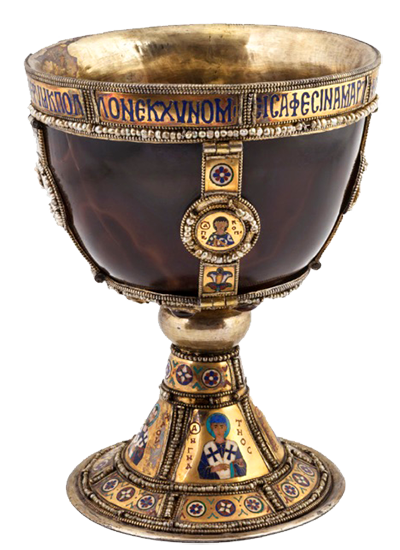
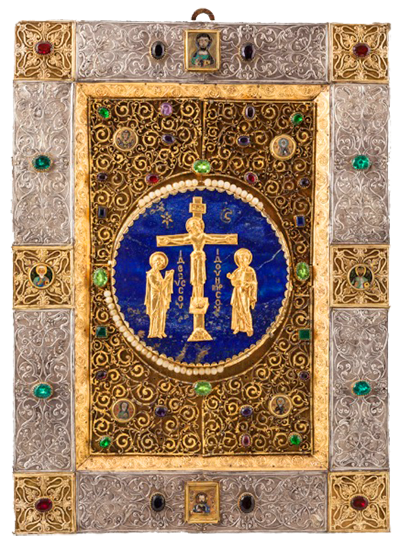
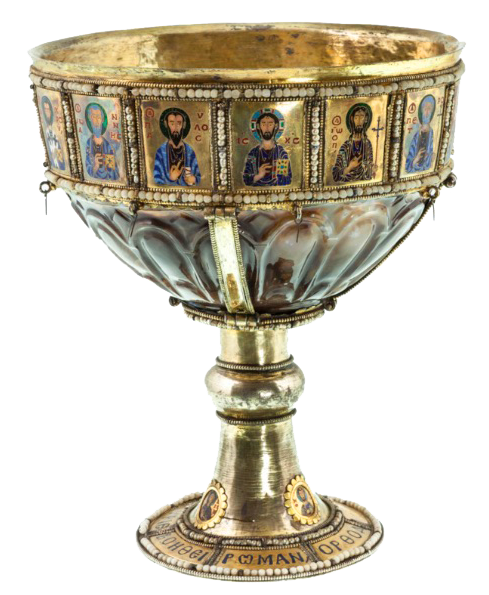
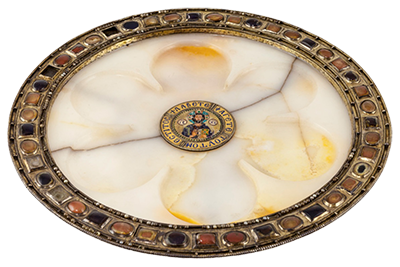
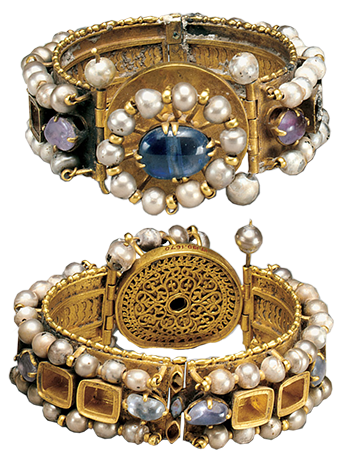
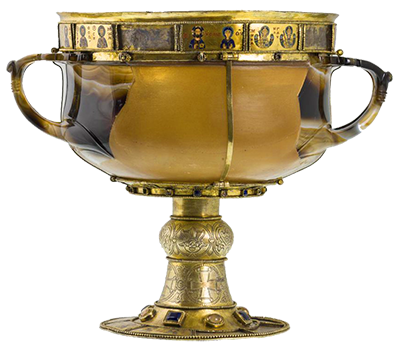
![]()
![]()
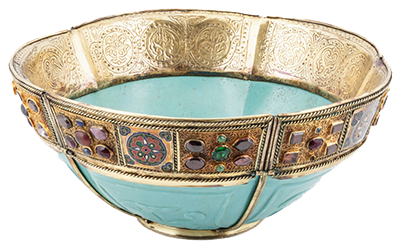
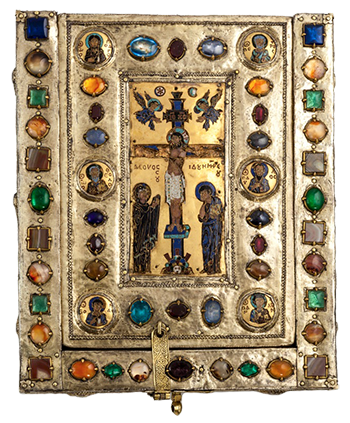
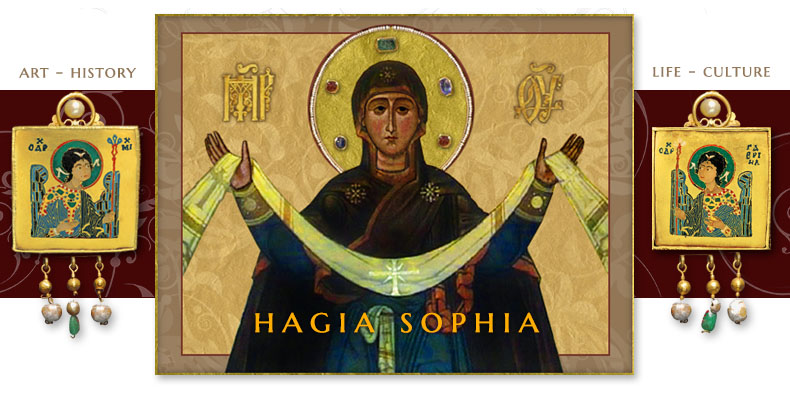
Heraclius and Martina
Over the eight years’ reign of Phocas and his consort we have little disposition, and not much occasion, to linger. The Empress Leontia is characterized for us only by the one contemptuous phrase that she was “as bad as Phocas.” We may trust that she equalled him neither in brutality nor licentiousness, but the slender indications suggest that she was some such low type of Syrian woman as a coarse and vicious soldier would be likely to choose for his companion. A few words must suffice to explain her exit from the imperial stage and the introduction of a fairer woman to the throne.
As the discontent increased in Constantinople, Phocas, his brutality fostered by indulgence and vice, turned upon his subjects with increasing savagery. Plots were discovered or suspected, and hands and feet and heads fell under the axes of the guards. At length Priscus heard that an upright and distinguished commander, who governed the African province, had cast off his allegiance to Phocas, and he invited Heraclius to come and seize the throne. Heraclius was too old to embark on so adventurous an enterprise, but in the spring of 609 he sent a fleet under the command of his son Heraclius and at the same time entrusted his nephew Nicetas with an army which was to range the coast of Africa and occupy Egypt. The curious statement, repeated in most historians, that whichever of the young men reached Constantinople first was to have the crown, is shown by a recently translated manuscript to be inaccurate,68 as we might suspect.13 Heraclius dallied in the Mediterranean until his cousin had made progress, and it was not until 3rd October 610 that the liberating fleet, exhibiting at the prow of its commander’s vessel a picture of the Virgin which angels had brought from heaven, came in sight of Constantinople. At once Phocas found a tide of desertions, and, after a feeble naval engagement on the following day, a Sunday, he fled in despair to the palace. So far was he abandoned that a citizen, whose wife he had violated, penetrated the palace during the night, dragged him to the quay, and took him on a boat to the fleet early on the Monday morning. Nicephorus, a later patriarch of Constantinople, gives us an appalling picture of his fate—and of Constantinople. He was at once cut to pieces, the member by which he had notoriously sinned was carried on a pole through the city, and his bleeding trunk was dragged through the streets and burned. Of the Empress Leontia and her fate we have no information.
The young Heraclius—he was in his thirty-sixth year, a robust, broad-chested man with fine grey eyes and light curly hair—must not be held responsible for the excesses of the Byzantine mob, though we shall not find him a man of delicate feeling. He proceeded at once, not only to assume the purple, but to provide Constantinople with an Empress. Fabia, daughter of an African noble named Rogatus, was in Constantinople with the wife of the elder Heraclius when it was announced that the African fleet lay in the Grecian waters. Phocas heard that the mother and the betrothed of his opponent were in the city, and they must have had a narrow escape from death. He was content, however, to confine them in a nunnery or penitentiary, and from this hazardous position Fabia was released to find her lover master of Constantinople. She was a beautiful and delicate girl, and the biographer must feel some impatience that the69 few Empresses of this more attractive character are so slenderly noticed by the chroniclers, while they dilate, as far as their prejudice against mere women will allow them, on the sins or audacities of the bolder Empresses.
Heraclius does not seem to have been eager to assume the purple, and, knowing as we do the accidents of imperial life and the degradation of the Empire, we can believe that he was sincere in offering the crown to Priscus, the son-in-law of Phocas. Priscus refused, and the long ceremonies of coronation at once proceeded. After the coronation in St Sophia he was married to Fabia, and, under the name of the Empress Eudocia, she entered the sacred palace which Leontia had vacated. But the story of Eudocia is brief and uninteresting, and we hardly make her acquaintance before a premature death removes her from the scene.
Indeed, the only details recorded of Eudocia are that she bore her husband two children in the first two years of her marriage and died of the strain. With the birth of her first child, Epiphania Eudocia, is connected one of those lively incidents which so well illustrate the character of the later Roman Empire, even under its better rulers. The patrician Priscus had refused the purple, but it came to the ears of Heraclius that he was secretly disaffected and abusive, and the Emperor chose a dramatic moment for disarming him. He invited Priscus to be godfather to the little Epiphania, and, in the midst of the ceremony, in view of the crowd of nobles and priests, charged him with his treachery. Striking Priscus on the face with a book which lay at hand—probably a Prayer Book—he directed that his head be shaven on the spot, and the great noble passed from the life of camp and Court to one of those monasteries of the Empire which harboured many such strange inmates.
In the following May (612) Eudocia bore a son, Heraclius Constantinas, and her frail constitution never recovered from the strain. She had gone during the70 summer to the healthier palace at Blachernæ, to the north of Constantinople, and there an attack of epilepsy carried her off in the month of August. It is painful to read that the funeral of this fine and delicate Empress was disgraced by one of the most repulsive exhibitions of Byzantine coarseness. The body was conveyed by water to the city, and borne solemnly through the streets to the great church between the mourning citizens. Just as the body was passing a certain window, a maid-servant, who was watching the procession, carelessly spat and the wind carried the spittle to the robes of the dead queen. The girl was burned alive on Eudocia’s tomb for the involuntary insult, and even her mistress escaped only by concealing herself.
Two years afterwards Heraclius married again. The new Byzantine Empress, whose name stands at the head of this chapter, was one of those strong and ambitious women who generally contrive, either by their vices or their crimes, to break through the anti-feminist reserve of the later Greek writers, but in this case the prejudice is increased and we follow Martina with difficulty through her long and adventurous career. She was the niece of Heraclius, and, in spite of the support she gave to her husband in his brilliant defence of eastern Christendom against the Persians, she remains under the shadow of the sin of incest.
Historians have devised many reasons for the audacity of Heraclius in marrying his niece, but we need hardly assume more than that she had a beauty and charm which the ecclesiastical writers disdain to confess. Her father was dead, and she lived in Constantinople with her mother Maria, sister of Heraclius, who had married a second time. Young, spirited and ambitious, she welcomed the passion of the Emperor, and was prepared with him to override every ecclesiastical scruple. The archbishop Sergius, a friendly and very able counsellor of the Emperor, tried in vain to dissuade them. Heraclius coolly observed that his objections were quite71 natural from his episcopal point of view, but it was useless to urge them, and the patriarch discreetly stood aside and allowed another priest to marry them. According to a reliable historian the patriarch himself afterwards crowned her in the great hall of the palace, and no doubt his bold and politic action silenced the angry murmurs which arose in the Hippodrome. It was only when, in the course of time, defective children were born of the marriage—the first son was wry-necked, the second deaf—when Heraclius himself ended a brilliant career in pain and humiliation, and when Martina passed from public life under a suspicion of murder, that Constantinople discovered the action of a divine curse and darkened the memory of Martina.
So prejudiced are later historians against Martina that even Gibbon has contracted something of their feeling, and suggested that a surrender to the charms, if not the arts, of Martina explains that remarkable indolence which Heraclius betrayed during the next few years, when the advancing Persians were rending his Empire and threatening to sweep Christianity out of Asia. We need not discuss here the problem of the Emperor’s alleged supineness during those years of disaster. The most recent biographer of Heraclius, Signor Pernice (“L’Imperatore Eraclio”), emphatically denies that Heraclius was indolent, and more authoritative historians, like Professor Bury, observe that the lack of funds and troops, and other internal difficulties, placed a formidable restraint on the very capable Emperor. When the war-drums beat at length, we shall find Martina, in spite of pregnancy, accompanying the Emperor in his long and arduous campaigns, and this gives us a right to assume that she supported him in the long years of preparation and organization.
At one time, three or four years after their marriage, it seemed that they would desert the sinking vessel of the Byzantine Empire and return to the tranquillity of Africa. Two devastating waves—the Persians to the72 south and the Avars to the north—were advancing across the impotent provinces, and it looked as though the little that was left of the Eastern Empire must soon be swallowed up in the mighty clash of their conflict. Egypt, Syria and Palestine were in the hands of the Persians, who looted and desecrated the most sacred shrines of Christendom. Famine resulted from the loss of the grain-bearing provinces, and plague followed closely upon famine. Heraclius and Martina put their treasures on a fleet of ships and resolved to transfer the throne to Africa. Then, when news came that the fleet had been destroyed in a storm, and the patriarch Sergius made the Emperor swear not to desert the city, Heraclius turned again to face his mountainous difficulties.
Raising the cry that the holy cross was in the hands of the pagans, and that the very existence of Christianity was in jeopardy, Heraclius succeeded in concentrating on a great national issue all the religious passion which had so long been expended on distracting controversies. A bargain was struck with the Church; its sacred vessels and incalculable treasures were to be put at the disposal of the Empire, and the value returned at the close of the war. By the beginning of the year 622 the preparations were completed, the young Heraclius Constantine was appointed nominal regent of the Empire, and the real administration was entrusted to the capable hands of the archbishop and one of the patricians. On Easter Day the last stirring services were held; and on the following day the gilded imperial galley, bearing the miraculous picture of the Virgin, the brightly painted war-galleys and the hundreds of ships which bore the last part of an army of more than a hundred thousand men, sailed bravely toward the coast of Asia.
The Persian campaigns, which have put the name of Heraclius high in the list of imperial commanders, interest us because Martina set sail with her husband and accompanied him throughout the war. Unfortunately, the literary deacon of St Sophia, George of Pisidia,73 who tells the story of the war, shares the ecclesiastical prejudice against Martina, and never mentions her name. Congenial as the task would be, therefore, to follow the Emperor through his brilliant campaigns and imagine the spirited Martina sharing his perils and his triumphs, it is hardly a fitting task for a biographer. George of Pisidia, addressing Heraclius in the name of the clergy at St Sophia, had trusted that he would redden his black military boots in the blood of the heathen. He and Martina returned to Constantinople six months later, leaving the army in safe winter quarters, with a great victory and a brilliant march across Asia Minor to report. Martina sailed with her husband, in the following year, on his second and more dangerous campaign, and it was in the course of this campaign that she gave birth to the son Heraclius—usually called Heraclonas, to distinguish him from the father, apparently—whom we shall find tragically associated with her in her later years. She seems, indeed, to have accompanied Heraclius on all his journeys; but to what extent she kept pace with the advance of the troops—whether she reached the banks of the Euphrates and Tigris, and beheld the oriental luxury of the fallen camps and towns of the Persians—the prejudice of the deacon of St Sophia prevents us from ascertaining. She had at least the glory of accompanying her husband on one of the most brilliant, the most daring and the most profitable campaigns that ever illumined the Eastern Empire. Nor must her biographer forget to add that she bore several children during her six years’ wandering over the mountains and deserts of Asia Minor, Syria, Persia and Mesopotamia. Nine children, four of whom died young, were the issue of the marriage.
Martina shared, too, the splendid triumph which crowned the victories of Heraclius. In the spring of 628 the Emperor and Empress rejoined their family at the Hieria palace, on the Asiatic coast opposite Constantinople, whither, with torches by night and olive-branches74 by day, the citizens sailed to greet them. Heraclius would not return to his capital until the cross was restored to his hands, and the summer was spent by the united family in the Hieria palace. Early in September the cross arrived, and they went to Constantinople for the triumph. Preceded by the cross, Heraclius rode in a chariot drawn by four elephants through the Golden Gate and along the main street of the city (the Mese) to St Sophia, amidst scenes of such rejoicing as the Empire had not witnessed since the days of Belisarius. A superb entertainment in the Hippodrome followed, and then Heraclius joined his wife in the palace.
And here ends the glory of the Emperor Heraclius; the flame that had burst forth so splendidly in a time of dejection fell just as swiftly, and Heraclius exhibited a lamentable spectacle in face of an even greater peril than the Persians. The problem of the character of Heraclius might concern us if we had any satisfactory information about the behaviour of Martina during the next few years, but as the chroniclers almost refuse to notice her until they come to what they regard as her misdeeds, we have no occasion to linger over it. Her character induces us to believe that she attempted to awaken her husband from his lethargy until she saw that this was impossible, and that she then devoted her thoughts to securing the succession for her son and the virtual rule of the Empire for herself. This, in point of fact, is suggested by the meagre indications in the chronicles.
In the spring of 629 Heraclius took the cross back to its original shrine at Jerusalem, and from that time spent nine years in the provinces of Palestine, Syria and Asia Minor. During those years the Mohammedan power became a formidable menace to the Roman Empire, and the inaction of Heraclius is a scandal to historians. His nervous system was strained to the verge of insanity, and he retreated like one paralysed with terror before the advance of the Mohammedans. Martina foresaw the end, and began to prepare for the succession. There75 can be no doubt that in these later years Heraclius, whose religious fervour was now greatly increased, was troubled by the cry that his “incestuous” marriage had brought these troubles on the Empire. When his nephew Theodore retreated before the invincible Arabs, and came to reproach Heraclius for his “sin,” the Emperor sent him under guard to Constantinople and ordered that he should be disgraced. Some writers see in this the action of Martina, but it may quite well have been due to the broody nervousness of Heraclius himself.
It was plain that Heraclius would not stem the Mohammedan tide, and everywhere men talked of the succession. By the year 638 he and Martina were back in the Hieria palace, and the struggle deepened. Heraclius had now two children by his first wife Eudocia, and five (living) children by Martina. His eldest child, Epiphania Eudocia, had narrowly missed a romantic career. During the Persian war Heraclius had struck an alliance with the King of the Khazars, a wild people akin to the Huns, and, after gorgeously entertaining and rewarding him, had shown him a miniature of his beautiful daughter, then fifteen years old, and offered him her hand. It was only the death of the King in the next year that saved the delicate young girl from being added to the rude harem of the Hunnic prince. She was still unmarried. Her brother, Heraclius Constantinus, now twenty-six years old, was already associated in the Empire, and was the obvious heir to supreme power. But both Heraclius and Martina knew that the Emperor’s death would at once set her religious enemies to work to eject her and her children from the palace, and they were anxious to secure her position by associating her eldest son, Heraclonas, in the Empire. There were, besides, a natural son of Heraclius by an early concubine, named Athalaric, and the sons of his cousin Nicetas, who had helped him to win the Empire.
Two of these possible candidates for the purple were summarily dismissed. Athalaric and the nephew76 Theodore were charged with conspiracy at Constantinople, their hands and feet were struck off, and they were sent into exile. It is conjectured by some writers on Martina that she dictated this heavy punishment, and that her hand is seen in the events which follow. Of this there is no proof; but there can be no doubt that she was eager to secure the succession of Heraclonas, and that Heraclius was now an almost feeble-minded patient under her care. He persistently refused to cross the strip of water from Hieria to the city, and they were compelled at length to make a bridge of boats across the narrower part of the strait, and place artificial hedges of trees along its sides, so that he could ride to Constantinople without catching sight of the sea. The young Constantine, his eldest son, had inherited the delicacy of his mother, and it was necessary to provide for the event of his death. Should his sons inherit the purple, or should it pass to “the children of incest”? The city seethed with discussion.
In the final decision we may confidently recognize the voice of Martina. On 4th July 638 Heraclonas, then a boy of fifteen years,14 was crowned in the palace by the patriarch Sergius; a younger son, David, was raised to the same dignity shortly afterwards, and the young daughters of Martina, Augustina and Martina, were entitled Augustæ. On the 1st of January 639 three Emperors rode in the procession: Heraclius, Constantine and Heraclonas. Martina had, apparently, triumphed; but more prudent citizens must have shaken their heads in reflecting on the struggle which would inevitably follow the death of Heraclius.
The Emperor lingered for more than two years in his impotent condition, and Martina meantime found a fresh and most powerful ally. The patriarch Sergius had died soon after crowning Heraclonas, leaving his metropolitan77 see to a monk, Pyrrhus, whom he had raised to the higher rank of the clergy. Pyrrhus became an ally of the Empress, who may possibly have assisted in his elevation, and the alliance was the stronger because Pyrrhus secretly favoured the sect of the Monophysites. From Constantine he would receive little encouragement, whereas Martina, as events proved, was ready to allow him to impose his metaphysical distinction on the Church in return for his political support. It is even said that Martina urged her husband to send the weakly Constantine against the Mohammedans, in the hope that he would not return. Such things are easily said, and easily believed, but incapable of proof.
In February 641 Heraclius died. He suffered in his last years from dropsy, and those who are curious to know by what appalling means the medical men of the time relieved such an affliction, and how the theologians of the time placidly traced the operation of a divine curse for marrying one’s niece, may read the details of his sufferings in the patriarch Nicephorus. To the last Heraclius was faithful to his beloved wife. He divided the government of the Empire equally between Constantine and Heraclonas, and he entrusted to the patriarch Pyrrhus a large sum of money to be given to Martina in the event of her enemies succeeding in driving her from power. The struggle began at once.
Martina convoked a meeting of the citizens—presumably in the Hippodrome—and had the will of Heraclius read to them. When the herald had concluded, the sullen silence was broken by a cry for the Emperors. Martina, who was evidently minded to keep the youths in the background and govern in their name, summoned the Emperors, but continued to act as mistress of the Empire. But Constantinople—a compound of inferior Greek and Roman with Syrian blood—always disliked feminine rule, and in face of the advancing Mohammedans regarded it with additional concern. “Honour to you as mother of the Emperors,” the citizens cried, “but78 to them as Emperors and lords. You, mistress, would not be able to resist and reply to barbarians and foreigners coming against the city. God forbid that the Roman commonwealth should fall so low.” We may take it that the chronicler has gathered into a speech the various murmurs which arose from the crowded benches of the Hippodrome. Plausible as the cry was, it was a grave blunder. The ailing, probably consumptive, Constantine had not the manliness of a ruler, and the palace became the theatre of the struggles of rival courtiers.
On the side of Constantine was the imperial treasurer Philagrius, and this man embittered the situation by informing the young Emperor of the money which Heraclius had left in charge of the archbishop and forcing him to pay it into the treasury. In order further to strengthen his position Philagrius represented to Constantine that his children would be in danger from Martina if he died. It is important to notice that the death of Constantine was plainly expected by all parties. Nothing is clearer than that he had inherited the delicacy of his mother, and was either epileptic or consumptive—more probably consumptive. The patriarch Nicephorus tells us that he was “chronically ill” and lived in a palace he had built at Chalcedon for the sake of his health. His Empress, Gregoria Anastasia, was a daughter of Nicetas, the young cousin who had set out from Africa with Heraclius, but we have no further information about her. For her sake and that of the children Constantine was persuaded by his intriguing courtiers to send an officer, Valentine, to the troops when he felt that his end was near. Valentine had not only a letter urging the troops to protect Constantine’s children from Martina, but a large sum of money to distribute amongst them. It is strange that historians have overlooked this very obvious intrigue and so easily accepted the clerical prejudice against Martina. If Martina were unable to meet “barbarians and foreigners”—a point79 which might be disputed—assuredly infants could not be trusted to do so.
Constantine died about three months after the death of his father. There is no serious ground whatever for the charge that he was poisoned by agents of Martina and Pyrrhus. The patriarch Nicephorus, the best authority, knows nothing of the rumour, and the very chroniclers, of a later date, who attach importance to it admit that Constantine suffered from a chronic malady. Indeed, when we find a contemporary (and recently published) ecclesiastical writer, the Bishop of Nikin, saying that Constantine after three months’ illness “vomited blood, and when he had lost all his blood he died,” we may confidently acquit Martina, and conclude that the young Emperor died of consumption. The statement of Constantine’s son, a boy of eleven, when he came to the throne, that Pyrrhus and Martina had been justly punished, is a mere echo of the pretext of those who deposed her. The poisoning of a consumptive youth would be a new and superfluous crime, and we have no reason to think that Martina was even normally criminal.
Martina at once assumed the government in the name of her son and expelled the hostile faction from the Court. Philagrius was visited with the most humane punishment of the time—he was forced to become a priest—and his friends were dispersed. But his emissary Valentine was in a strong position and he determined to put it to account. The large sum of money entrusted to him enabled him to purchase the devotion of an army, and he settled at Chalcedon with the ostentatious design of seeing that no evil was done to the young son of the late Emperor. Martina cleverly foiled his first move. She directed Heraclonas to become godfather to the boy, who was carefully kept in the palace at Constantinople, and to swear, with his hand on the cross, that no harm should be done to the child. Valentine then brought his troops nearer and began to ravage the suburbs and neighbourhood of the city, while his friends in Constantinople lit80 the flame of religious antagonism to Pyrrhus, who was unfortunately pressing his Monophysite tenets on the Church. Exasperated at the inconveniences of the siege and the heresy of the patriarch, the citizens now became restive. A mob invaded and pillaged the great church of St Sophia, and Pyrrhus was forced to abdicate. The power of Martina was now dangerously enfeebled, and she came to terms with Valentine. The ambitious officer was to be appointed “Count of the Excubitors,” or commander of the heavier guards, and to be excused from rendering an account of the money entrusted to him.
The further course of the intrigue is scantily known to us, as there is here a mysterious gap of thirty years in the narrative of Nicephorus. From later chronicles we learn that, before the end of 642, the Senate deposed Martina and Heraclonas. In spite of the notorious malady of Constantine, they were found guilty of having poisoned him, with the connivance of the archbishop, and were barbarously punished. The tongue of Martina and the nose of Heraclonas were slit—the text does not imply that they were cut off—and they were expelled from Constantinople. Valentine also is said to have been expelled, so that he must have changed sides. The further course of the spirited and unfortunate Empress and her son is told in the bare phrase that they “lived a private life and were buried together in the monastery of the Lord.” We do not know the place of exile, or the year of Martina’s death. That her punishment was unjust and barbaric seems now to be beyond question, and there is no excuse, beyond the amiable indiscretion of her marriage, for the evil repute which chroniclers have attached to the name of the Empress Martina. She seems to have been one of the best of the Byzantine Empresses.




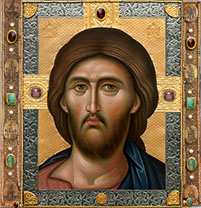 click here for icons of christ
click here for icons of christ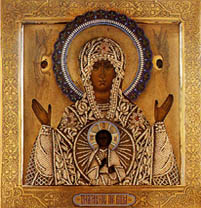 click here for icons of the theotokos
click here for icons of the theotokos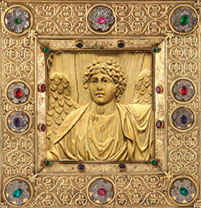 click here for icons of angels
click here for icons of angels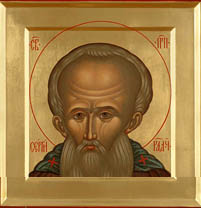 click here for icons of saints
click here for icons of saints








